President of Guatemala
This article needs additional citations for verification. (April 2019) |
| President of the Republic of Guatemala | |
|---|---|
| Presidente de la República de Guatemala | |
 | |
 | |
since 15 January 2024 | |
| Office of the President of Guatemala National Security Council | |
| Style | Most Excellent Mr. President of the Republic (official) Mr. President (informal) |
| Status | Head of state Head of government |
| Member of | Cabinet |
| Residence | Casa Crema |
| Seat | Guatemala City |
| Appointer | Supreme Electoral Court |
| Term length | Four years, non-renewable |
| Constituting instrument | Guatemalan Constitution |
| Inaugural holder | Mariano Rivera Paz |
| Formation | 3 December 1839 |
| Deputy | Vice President of Guatemala |
| Salary | 146,950 GTQ monthly ($18,863 as of May 2023)[1] |
| Website | www.presidencia.gob.gt |
| This article is part of a series on |
| Politics of Guatemala |
|---|
 |
|
|
The president of Guatemala (Spanish: Presidente de Guatemala), officially titled President of the Republic of Guatemala (Spanish: Presidente de la República de Guatemala), is the head of state and head of government of Guatemala, elected to a single four-year term. The position of President was created in 1839.
Selection process
[edit]Eligibility
[edit]Article 185 of the Constitution, sets the following requirements to qualify for the presidency:
- be Guatemalan of origin who is a citizen in good standing;
- be at least 40 years old.
A person who meets the above qualifications would, however, still be disqualified from holding the office of president if the individual:
- Was the leader or the head of a coup d'état, armed revolution, or similar movement, that had altered the constitutional order, and as a result of their actions became the Head of Government;
- Exercised the role of President or Vice President during an election, or at any point within the presidential period in which elections are conducted.
- Are relatives of the incumbent president or vice president prior to the succeeding election;
- Served as a Minister within the government, for any time in the six months before the election;
- Served as a member of the Armed Forces unless they are on leave or have been in retirement for at least five years before the election;
- Are ministers of any religion or cult;
- Are magistrates of the Supreme Electoral Tribunal.
Term Limit
[edit]The President serves a four-year term and is prohibited from seeking re-election or extending their tenure. Moreover, a person who held the position of president for more than two years is barred from running for office again.
Executive powers
[edit]Article 183 of the Constitution, confers the following duties and competencies to the president:
- Comply with and enforce the Constitution and laws.
- Provide the defense and security of the Nation, as well as the preservation of public order.
- Exercise the command of the Armed Forces of Guatemala with all the respective functions and attributions.
- Exercise the command of the National Police.
- Approve, promulgate, execute and enforce laws.
- Dictate the provisions that are necessary in cases of serious emergency or public calamity, having to report to the Congress in its immediate sessions.
- Submit proposals of laws to the Congress.
- Exercise the right of veto with respect to the laws issued by the Congress, except in cases in which it is not necessary to sanction the executive branch in accordance with the Constitution.
- Present annually to the Congress, at the beginning of its session, written report on the general situation of the Republic and of the business of its administration carried out during the previous year.
- Submit annually to the Congress, for approval with no less than one hundred and twenty days prior to the date on which the fiscal year begins, through the Ministry of Public Finance, the draft budget that contains in detail the income and expenditures of the State. If the Congress is not in session, it must hold extraordinary sessions to hear about the project.
- Submit for consideration of the Congress for approval, and before ratification, treaties and conventions of international character and contracts and concessions on public services.
- To summon the Legislative Organism to extraordinary sessions when the interests of the Republic demand it.
- Coordinate the development policy of the Nation through the Council of Ministers.
- Preside over the Council of Ministers and exercise the function of hierarchical superior of the officials and employees of the Executive Organism.
- Maintain the territorial integrity and dignity of the Nation.
- Direct foreign policy and international relations, pronounce, ratify and denounce treaties and agreements in accordance with the Constitution.
- Receive the diplomatic representatives, as well as issue and withdraw the exequatur to the patents of the consuls.
- Administer public finances in accordance with the law.
- Exonerate of fines and surcharges to the taxpayers who have incurred in them for not covering the taxes within the legal terms for acts or omissions in the administrative order.
- Appoint and remove ministers of state, deputy ministers, secretaries and undersecretaries of the presidency, ambassadors and other officials that correspond to it according to the law.
- Grant premiums, pensions and subsidies in accordance with the Law.
- Award decorations to Guatemalans and foreigners.
- Within the fifteen days following its conclusion, inform the Congress about the purpose of any trip that has taken place outside the national territory and about the results thereof.
- Submit every four months to the Congress through the respective ministry an analytical report on the budget execution, for its knowledge and control.
- Exercise all other functions assigned by the Constitution or the law.
Vacancies and succession
[edit]Article 189 of the Constitution establishes the presidential line of succession. If the president is temporarily absent, the vice president takes over the presidency. If the absence of the President is permanent, the vice president holds the presidency until the end of the constitutional period. In the event of a double vacancy, Congress has the authority to designate an acting president by a vote of two-thirds of the total number of deputies.
Presidents of Guatemala
[edit]Note: Regarding the numbering of the terms, several reliable sources state that Jimmy Morales is the 50th president[2][3][4]
State of Guatemala (1839–1847)
[edit]| No. | Portrait | Name (Birth–Death) |
Term of office | Political party | Elected | ||
|---|---|---|---|---|---|---|---|
| Took office | Left office | Time in office | |||||
| 1 | 
|
Mariano Rivera Paz (1804–1849) |
3 December 1839 | 25 February 1842 | 2 years, 84 days | Conservative | — |
| 2 | 
|
José Venancio López (1791–1863) Acting |
25 February 1842 | 14 May 1842 | 78 days | Independent | — |
| 3 | 
|
Mariano Rivera Paz (1804–1849) |
14 May 1842 | 14 December 1844 | 2 years, 214 days | Conservative | — |
| 4 | 
|
Rafael Carrera (1814–1865) |
14 December 1844 | 16 August 1848 | 3 years, 246 days | Conservative | — |
Republic from Carrera to the Liberal Revolution (1847–1871)
[edit]| No. | Portrait | Name (Birth–Death) |
Term of office | Political party | Elected | ||
|---|---|---|---|---|---|---|---|
| Took office | Left office | Time in office | |||||
| 4 | 
|
Rafael Carrera (1814–1865) |
14 December 1844 | 16 August 1848 | 3 years, 246 days | Conservative | — |
| 5 | 
|
Juan Antonio Martínez (?–1854) Acting |
16 August 1848 | 28 November 1848 | 104 days | Conservative | — |
| 6 | 
|
José Bernardo Escobar (1797–1849) Acting |
28 November 1848 | 1 January 1849 | 34 days | Conservative | — |
| 7 | 
|
Mariano Paredes (1800–1856) Acting |
1 January 1849 | 6 November 1851 | 2 years, 309 days | Independent | — |
| 8 | 
|
Rafael Carrera (1814–1865) |
6 November 1851 | 14 April 1865 | 13 years, 159 days | Conservative | — |
| 9 | 
|
Pedro de Aycinena y Piñol (1802–1897) Acting |
14 April 1865 | 24 May 1865 | 40 days | Conservative | — |
| 10 | 
|
Vicente Cerna Sandoval (1815–1885) |
24 May 1865 | 29 June 1871 | 6 years, 36 days | Conservative | — |
Liberal period (1871–1944)
[edit]| No. | Portrait | Name (Birth–Death) |
Term of office | Political party | Elected | ||
|---|---|---|---|---|---|---|---|
| Took office | Left office | Time in office | |||||
| 11 | 
|
Miguel García Granados (1809–1878) |
29 June 1871 | 4 June 1873 | 1 year, 340 days | Liberal | — |
| 12 | 
|
Justo Rufino Barrios (1835–1885) |
4 June 1873 | 2 April 1885 | 11 years, 302 days | Liberal | 1873 1880 |
| 13 | 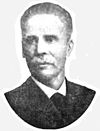
|
Alejandro M. Sinibaldi (1825–1896) Acting |
2 April 1885 | 5 April 1885 | 3 days | Liberal | — |
| 14 | 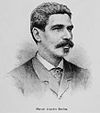
|
Manuel Barillas (1845–1907) |
6 April 1885 | 15 March 1892 | 6 years, 345 days | Liberal | — |
| 15 | 
|
José María Reina Barrios (1854–1898) |
15 March 1892 | 8 February 1898 | 5 years, 330 days | Liberal | 1892 |
| 16 | 
|
Manuel Estrada Cabrera (1857–1924) |
8 February 1898 | 15 April 1920 | 22 years, 67 days | Liberal | 1898 1904 1910 1916 |
| 17 | 
|
Carlos Herrera (1856–1930) |
15 April 1920 | 10 December 1921 | 1 year, 239 days | Unionist Party | 1920 (Apr) 1920 (Aug) |
| 18 | 
|
José María Orellana (1872–1926) |
10 December 1921 | 26 September 1926 | 4 years, 290 days | Liberal | 1921 1922 |
| 19 | 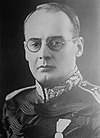
|
Lázaro Chacón González (1873–1931) |
26 September 1926 | 12 December 1930 | 4 years, 77 days | Unionist Party | 1926 |
| — | 
|
Baudilio Palma (1880–1930) Acting |
13 December 1930 | 17 December 1930 | 4 days | Conservative | — |
| — | 
|
Manuel María Orellana Contreras (1870–1940) De facto |
17 December 1930 | 2 January 1931 | 16 days | Liberal | — |
| 20 | 
|
José María Reina Andrade (1860–1947) Acting |
2 January 1931 | 14 February 1931 | 43 days | Liberal | — |
| 21 | 
|
Jorge Ubico (1878–1946) |
14 February 1931 | 1 July 1944 | 13 years, 138 days | Progressive Liberal Party | 1931 |
| 22 | 
|
Juan Federico Ponce Vaides (1889–1956) Acting |
1 July 1944 | 20 October 1944 | 111 days | Progressive Liberal Party | — |
Ten-Year Revolution (1944–1954)
[edit]The authoritarian regime of Jorge Ubico, which persisted since 1931, was overthrown by a revolution known as the "Ten Years of Spring" on 4 July 1944. After more than a month of mass student and trade union protests, Ubico resigned and fled to Mexico, transferring powers to his First Deputy, Federico Ponce Vaides. Presidential elections were held on 4 July 1944, which declared Ponce as the president. However, the opposition rejected the results, and as a result, on 20 October 1944, a group of young officers overthrew Ponce, creating a military-civilian government called the Revolutionary Government Junta. A new constitution was adopted and elections were held, which resulted in the victory of Juan José Arévalo in 1944 and Jacobo Árbenz in 1950. During this period, Guatemala underwent numerous social and economic reforms, including large-scale land reform.
| No. | Portrait | Name (Birth–Death) |
Term of office | Political party | Elected | ||
|---|---|---|---|---|---|---|---|
| Took office | Left office | Time in office | |||||
| 23 | 
|
Revolutionary Government Junta | 20 October 1944 | 15 March 1945 | 146 days | Military | — |
| 24 | 
|
Juan José Arévalo (1904–1990) |
15 March 1945 | 15 March 1951 | 6 years | Revolutionary Action Party | 1944 |
| 25 | 
|
Jacobo Árbenz (1913–1971) |
15 March 1951 | 27 June 1954 (Deposed) |
3 years, 104 days | Revolutionary Action Party / Party of the Guatemalan Revolution |
1950 |
Military governments (1954–1958)
[edit]Upon presenting his resignation, Jacobo Árbenz left Colonel Carlos Enrique Díaz, head of the Armed Forces, in charge of the presidency. Diaz's first measure was the integration of a provisional government board which he led alongside Colonels Elfego H. Monzón and José Ángel Sánchez. On 29 June, Díaz was forced to resign, leading to Monzón succeeding as the new chairman of the board. Monzón would assemble a new governing board and incorporate Colonel Castillo Armas, Juan Mauricio Dubois, Jose Luis Cruz Salazar, and Enrique Oliva.
The new board would dissolve after a popular plebiscite held on 10 October 1954 would allow Colonel Castillo Armas to assume the presidency. Under Armas' mandate, several reforms implemented during the Guatemalan Revolution were suspended, and political opponents, as well as unions and peasant organizations, were persecuted. Armas' assassination on 26 July 1957, would prompt Congress to appoint Luis Arturo González as acting president and condition him to call for elections within four months.
The planned election was held on 20 October 1957, but the results were later nullified due to allegations of fraud. President González would resign and cede power to a provisional governing board led by Óscar Mendoza Azurdia, Gonzalo Yurrita Nova, and Roberto Lorenzana. The new board would govern for two days before Congress would appoint Colonel Guillermo Flores Avendaño as acting president. President Avendaño would call for elections in January 1958.
| No. | Portrait | Name (Birth–Death) |
Term of office | Political party | Elected | ||
|---|---|---|---|---|---|---|---|
| Took office | Left office | Time in office | |||||
| 26 | 
|
Carlos Enrique Díaz de León (1915–2014) Provisional President |
27 June 1954 | 29 June 1954 | 2 days | Military | — |
| 27 | 
|
Elfego Hernán Monzón Aguirre (1912–1981) Chairman of Military Junta |
29 June 1954 | 8 July 1954 | 9 days | Military | — |
| 28 | 
|
Carlos Castillo Armas (1914–1957) |
8 July 1954 | 26 July 1957 | 3 years, 18 days | National Liberation Movement | 1954 |
| 29 | 
|
Luis Arturo González López (1900–1965) Acting |
27 July 1957 | 24 October 1957 | 89 days | Independent | — |
| 30 | 
|
Óscar Mendoza Azurdia (1917–1995) Chairman of Military Junta |
24 October 1957 | 26 October 1957 | 2 days | Military | — |
| 31 | 
|
Guillermo Flores Avendaño (1894–1982) Acting |
26 October 1957 | 2 March 1958 | 129 days | Military | — |
Civil War period (1958–1996)
[edit]| No. | Portrait | Name (Birth–Death) |
Term of office | Political party | Elected | ||
|---|---|---|---|---|---|---|---|
| Took office | Left office | Time in office | |||||
| 32 | 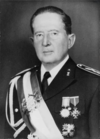
|
Miguel Ydígoras Fuentes (1895–1982) |
2 March 1958 | 31 March 1963 (Deposed) |
5 years, 29 days | Military / REDENCION |
1958 |
| 33 | 
|
Enrique Peralta Azurdia (1908–1997) |
31 March 1963 | 1 July 1966 | 3 years, 92 days | Institutional Democratic Party | — |
| 34 | 
|
Julio César Méndez Montenegro (1915–1996) |
1 July 1966 | 1 July 1970 | 4 years | Revolutionary Party | 1966 |
| 35 | 
|
Carlos Manuel Arana Osorio (1918–2003) |
1 July 1970 | 1 July 1974 | 4 years | Institutional Democratic Party | 1970 |
| 36 | 
|
Kjell Eugenio Laugerud García (1930–2009) |
1 July 1974 | 1 July 1978 | 4 years | Institutional Democratic Party | 1974 |
| 37 | 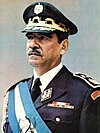
|
Fernando Romeo Lucas García (1924–2006) |
1 July 1978 | 23 March 1982 (Deposed) |
3 years, 265 days | Institutional Democratic Party | 1978 |
| 38 | 
|
Efraín Ríos Montt (1926–2018) |
23 March 1982 | 8 August 1983 (Deposed) |
1 year, 138 days | Military | — |
| 39 | 
|
Óscar Humberto Mejía Víctores (1930–2016) |
8 August 1983 | 14 January 1986 | 2 years, 159 days | Military | — |
| 40 | 
|
Vinicio Cerezo (born 1942) |
14 January 1986 | 14 January 1991 | 5 years | Guatemalan Christian Democracy | 1985 |
| 41 | 
|
Jorge Serrano Elías (born 1945) |
14 January 1991 | 1 June 1993 (Resigned) |
2 years, 138 days | Solidarity Action Movement | 1990 |
| 42 | 
|
Gustavo Adolfo Espina Salguero (1946–2024) Acting |
1 June 1993 | 5 June 1993 | 4 days | Solidarity Action Movement | — |
| 43 | 
|
Ramiro de León Carpio (1942–2002) |
6 June 1993 | 14 January 1996 | 2 years, 222 days | Independent | 1993 |
Contemporary period (1996–present)
[edit]| No. | Portrait | Name (Birth–Death) |
Term of office | Political party | Elected | ||
|---|---|---|---|---|---|---|---|
| Took office | Left office | Time in office | |||||
| 44 | 
|
Álvaro Arzú (1946–2018) |
14 January 1996 | 14 January 2000 | 4 years | National Advancement Party / Unionist Party |
1995–1996 |
| 45 | 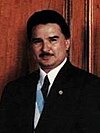
|
Alfonso Portillo (born 1951) |
14 January 2000 | 14 January 2004 | 4 years | Guatemalan Republican Front | 1999 |
| 46 | 
|
Óscar Berger (born 1946) |
14 January 2004 | 14 January 2008 | 4 years | National Solidarity Party / Grand National Alliance |
2003 |
| 47 | 
|
Álvaro Colom (1951–2023) |
14 January 2008 | 14 January 2012 | 4 years | National Unity of Hope | 2007 |
| 48 | 
|
Otto Pérez Molina (born 1950) |
14 January 2012 | 3 September 2015 (Resigned) |
3 years, 232 days | Patriotic Party / Grand National Alliance |
2011 |
| 49 | 
|
Alejandro Maldonado (born 1936) Acting |
3 September 2015 | 14 January 2016 | 133 days | Independent | — |
| 50 | 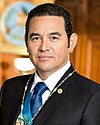
|
Jimmy Morales (born 1969) |
14 January 2016 | 14 January 2020 | 4 years | National Convergence Front | 2015 |
| 51 | 
|
Alejandro Giammattei (born 1956) |
14 January 2020 | 14 January 2024 | 4 years | Vamos | 2019 |
| 52 | 
|
Bernardo Arévalo (born 1958) |
15 January 2024 | Incumbent | 320 days | Semilla | 2023 |
Timeline
[edit]
Latest election
[edit]| Candidate | Running mate | Party | First round | Second round | |||
|---|---|---|---|---|---|---|---|
| Votes | % | Votes | % | ||||
| Sandra Torres | Romeo Guerra | National Unity of Hope | 881,592 | 20.98 | 1,567,664 | 39.09 | |
| Bernardo Arévalo | Karin Herrera | Semilla | 654,534 | 15.58 | 2,442,718 | 60.91 | |
| Manuel Conde | Luis Antonio Suárez | Vamos | 435,631 | 10.37 | |||
| Armando Castillo | Édgar Grisolia | Vision with Values | 404,059 | 9.61 | |||
| Edmond Mulet | Máximo Santa Cruz | Cabal | 371,857 | 8.85 | |||
| Zury Ríos | Héctor Cifuentes | Valor–Unionist | 365,028 | 8.69 | |||
| Manuel Villacorta | Jorge Mario García | Will, Opportunity and Solidarity | 238,686 | 5.68 | |||
| Giovanni Reyes | Óscar Figueroa | Bienestar Nacional | 141,714 | 3.37 | |||
| Amílcar Rivera | Fernando Mazariegos | Victory | 135,591 | 3.23 | |||
| Amílcar Pop | Mónica Enríquez | Winaq–URNG–MAIZ | 87,676 | 2.09 | |||
| Ricardo Sagastume | Guillermo González | Todos | 76,582 | 1.82 | |||
| Rudy Guzmán | Diego González | Nosotros | 66,116 | 1.57 | |||
| Isaac Farchi | Mauricio Zaldaña | Blue Party | 61,472 | 1.46 | |||
| Julio Rivera | José Urrutia | My Family | 46,092 | 1.10 | |||
| Francisco Arredondo | Francisco Bermúdez | Commitment, Renewal and Order | 41,948 | 1.00 | |||
| Giulio Talamonti | Óscar Barrientos | Republican Union | 40,358 | 0.96 | |||
| Hugo Peña | Hugo Johnson | Elephant Community | 39,271 | 0.93 | |||
| Rudio Lecsan Mérida | Rubén Darío Rosales | Humanist Party | 34,285 | 0.82 | |||
| Rafael Espada | Arturo Herrador | Republican Party | 32,139 | 0.76 | |||
| Sammy Morales | Miguel Ángel Moir | National Convergence Front | 22,316 | 0.53 | |||
| Álvaro Trujillo | Miguel Ángel Ibarra | Change | 17,715 | 0.42 | |||
| Luis Lam Padilla | Otto Marroquín | National Integration Party | 7,780 | 0.19 | |||
| Total | 4,202,442 | 100.00 | 4,010,382 | 100.00 | |||
| Valid votes | 4,202,442 | 75.62 | 4,010,382 | 95.25 | |||
| Invalid votes | 966,389 | 17.39 | 147,165 | 3.50 | |||
| Blank votes | 388,442 | 6.99 | 52,687 | 1.25 | |||
| Total votes | 5,557,273 | 100.00 | 4,210,234 | 100.00 | |||
| Registered voters/turnout | 9,249,794 | 60.08 | 9,361,068 | 44.98 | |||
| Source: TSE (first round; 99.13% counted) TSE (second round; 100% counted) | |||||||
Notes
[edit]References
[edit]- ^ Rony Ríos (17 January 2017). "Jimmy Morales el presidente mejor pagado de Latinoamérica". elPeriódico. Archived from the original on 19 January 2018. Retrieved 19 May 2018.
- ^ "Jimmy Morales tomó la banda presidencial como el 50° Presidente de la República de Guatemala". TN23 (news station, original in video). 16 January 2016. Archived from the original on 12 December 2021. Retrieved 5 April 2019.
- ^ "Jimmy Morales asume como nuevo presidente de Guatemala". CNN Español. 14 January 2016. Archived from the original on 4 February 2016. Retrieved 5 April 2019.
- ^ Tulio Juárez (17 March 2017). "¿Qué le obsequiaría usted este sábado al presidente Jimmy Morales en su 48 cumpleaños?". elPeriódico. Archived from the original on 5 April 2019. Retrieved 5 April 2019.



